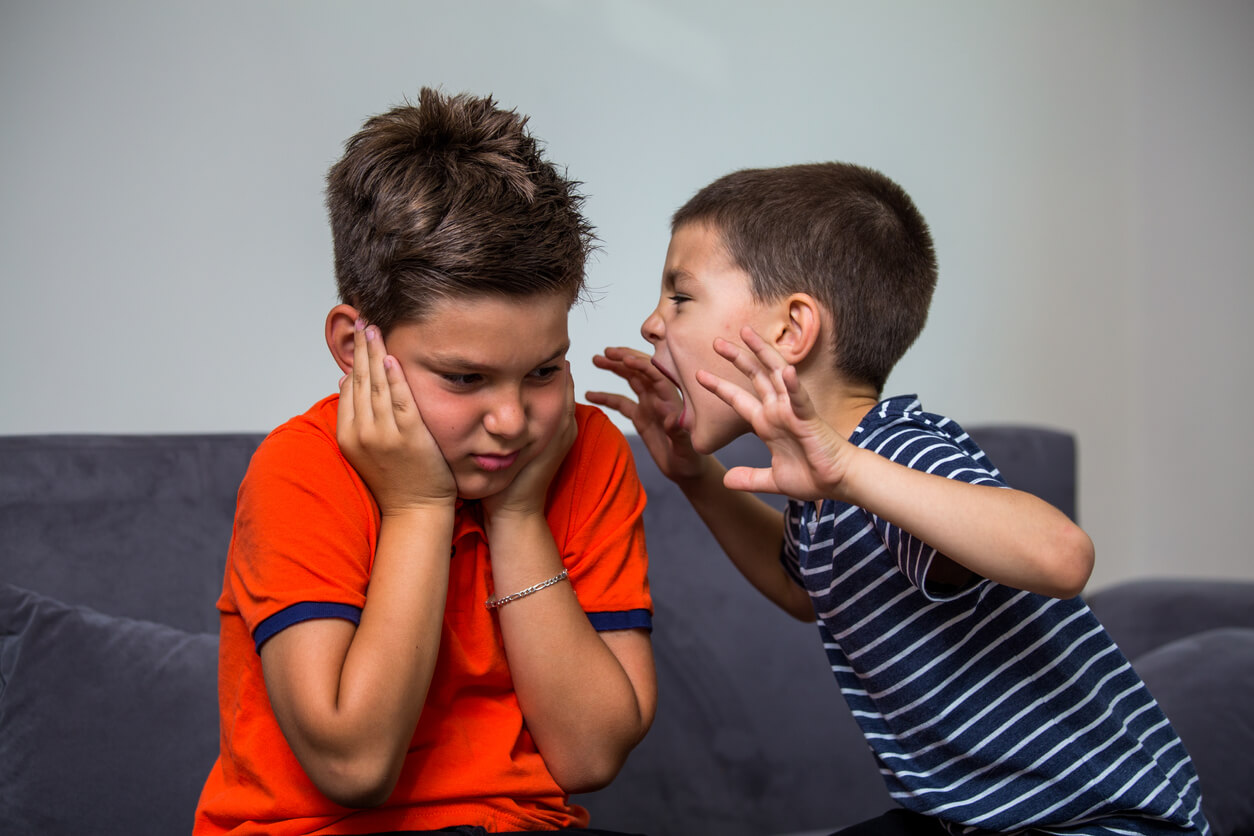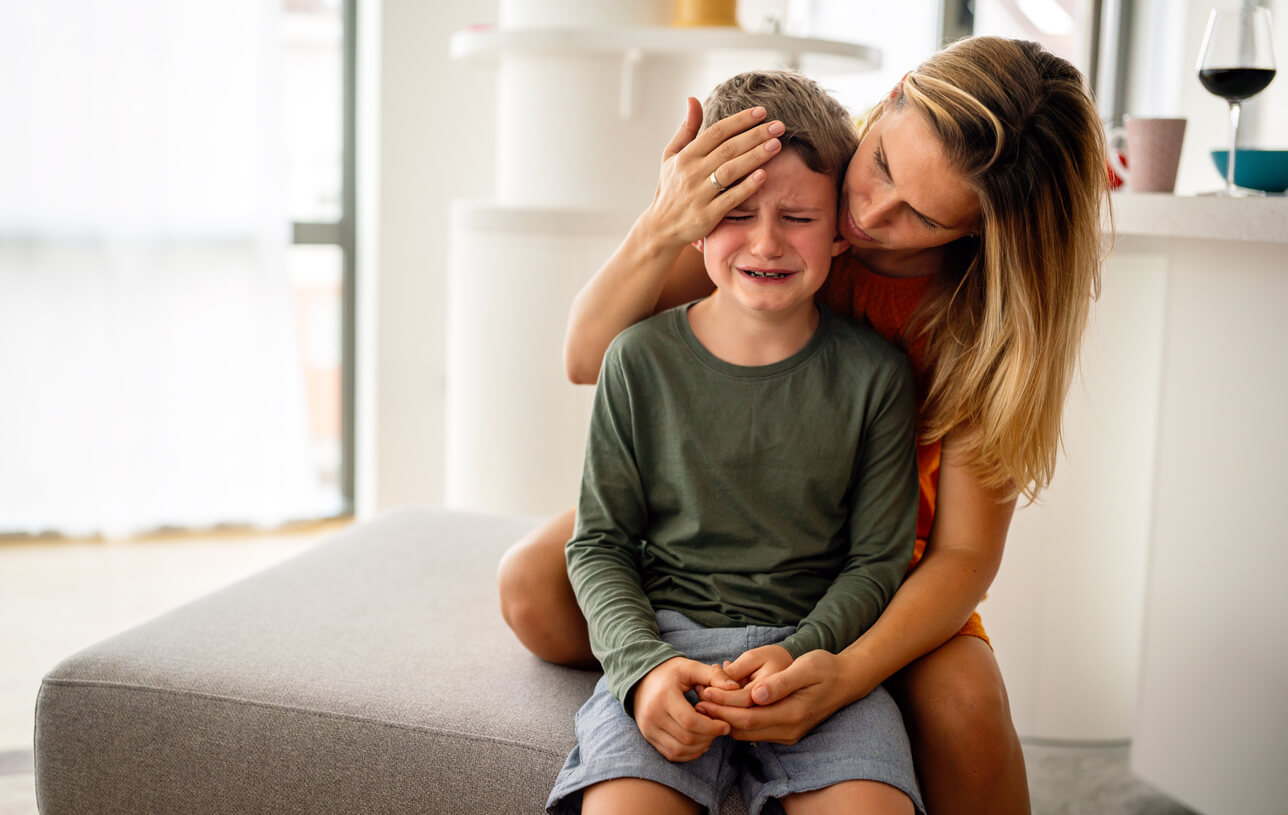My Children and My Partner's Children Don't Get Along: What to Do?


Written and verified by the psychologist Elena Sanz Martín
Our society changes and, with it, so do the family models. Today, in the United States and other countries with similar legislation, nearly 50% of marriages end in divorce. And many of them dissolve after having children together. When these parents rebuild their lives with other people, the change can be complicated for the children and difficulties may arise. For example, if the couple’s own children and their partner’s children don’t get along.
Shared custody is an increasingly common reality. In fact, it’s estimated that more than 43% of divorce cases end in shared custody. However, it can be emotionally challenging for a child to come to terms with the dissolution of their family as they knew it and to accept a new structure in which new people enter. So, if your children and your partner’s children don’t get along, don’t be alarmed, it may just take time. However, it’s important to take action to ensure the emotional well-being of the children and to ease the situation.
Why don’t my children and my partner’s children get along?
There are several reasons that may be behind this situation. Before rushing to judgment, it’s best to analyze, discuss, and stay calm to see what’s going on. Even so, here are some of the most common reasons.
They’re at different points in their lives
It’s natural for two children who’ve been together for many years to have a hard time getting along. If one child is just starting preschool and the other is close to adolescence, they’re in very different life stages. Consequently, they’ll hardly share interests or concerns.

Their personalities aren’t compatible
Even if the children are of similar ages, it’s possible that their personalities are very different. Just as you don’t like everyone you meet, neither does your little one. And your partner’s children may not be the people they would naturally choose as friends. They may have different interests, opposing values, or exhibit somewhat incompatible personality traits that cause them to clash with each other or fail to connect on a personal level.
There’s a problem of jealousy or insecurity
We can’t ignore that perhaps the problem isn’t the children themselves, but the situation they’re going through. Maybe in another context, they would have liked each other, but when they meet in the process of reconstituting a family, everything becomes more complicated. Your little one may feel jealous because now you also spend time with your partner’s children. They may even be afraid of losing your love or attention or having to divide them. Thus, they see your partner’s children as enemies or competitors.
There’s loyalty toward the other parent
It’s also possible that a child may refuse to relate to your new partner and their children because of loyalty to the other parent. They may feel that accepting the new family is a betrayal of their mother or father, and this makes them feel guilty. The rejection may then suggest an intention to protect the other parent’s feelings.
The child hasn’t accepted the family change yet
Finally, your children and your partner’s children may not get along because they’re still in the process of managing their parents’ separation and life change. For example, they may still have desires or hopes to regain their previous situation. Likewise, they may feel anger, sadness, or fear.
What to do if my children and my partner’s children don’t get along?
If you find yourself in this situation with your children, there are some guidelines you can follow to make the transition easier for them. We’ll tell you about them.

Validate their emotions
First of all, be patient and understanding. Of course, you want them to adapt quickly to the new family dynamic, but don’t force them to do so. Instead, talk to them, ask them how they feel, why they don’t like your partner’s children, and what they need. Let them know that their emotions are valid, that you understand them, and that you’re there for them.
Remember that love doesn’t change
Second, reassure them that some things won’t change. That they’re a family (even though you’ve separated from their other parent) and that they won’t lose the love, affection, or position they have in your lives. Remind them that you’ll still spend time alone with them and that your partner’s children aren’t their competitors.
Encourage closeness
It’s also a good option to encourage situations that are pleasant and positive for everyone. For example, sharing family moments or doing activities that have to do with the interests and tastes of the children. Spending time with other children in a friendly and relaxed atmosphere can help them get to know each other better. However, it’s important not to force these outings and only suggest them as an alternative.
Give the children time
It’s important to give the children time to process their losses and grief so that they can come to terms with their new reality. They may even need psychological support to achieve this.
Respect must prevail in the relationship
We’ve shared some suggestions for your children and your partner’s children to get along in the best way possible. However, if in spite of the efforts they don’t manage to get along, remember that it shouldn’t be an obligation to do so. In fact, the important thing is that you can treat each other with respect and consideration so that you can live together in peace. In short, we can’t force two people to like each other and get along.
Our society changes and, with it, so do the family models. Today, in the United States and other countries with similar legislation, nearly 50% of marriages end in divorce. And many of them dissolve after having children together. When these parents rebuild their lives with other people, the change can be complicated for the children and difficulties may arise. For example, if the couple’s own children and their partner’s children don’t get along.
Shared custody is an increasingly common reality. In fact, it’s estimated that more than 43% of divorce cases end in shared custody. However, it can be emotionally challenging for a child to come to terms with the dissolution of their family as they knew it and to accept a new structure in which new people enter. So, if your children and your partner’s children don’t get along, don’t be alarmed, it may just take time. However, it’s important to take action to ensure the emotional well-being of the children and to ease the situation.
Why don’t my children and my partner’s children get along?
There are several reasons that may be behind this situation. Before rushing to judgment, it’s best to analyze, discuss, and stay calm to see what’s going on. Even so, here are some of the most common reasons.
They’re at different points in their lives
It’s natural for two children who’ve been together for many years to have a hard time getting along. If one child is just starting preschool and the other is close to adolescence, they’re in very different life stages. Consequently, they’ll hardly share interests or concerns.

Their personalities aren’t compatible
Even if the children are of similar ages, it’s possible that their personalities are very different. Just as you don’t like everyone you meet, neither does your little one. And your partner’s children may not be the people they would naturally choose as friends. They may have different interests, opposing values, or exhibit somewhat incompatible personality traits that cause them to clash with each other or fail to connect on a personal level.
There’s a problem of jealousy or insecurity
We can’t ignore that perhaps the problem isn’t the children themselves, but the situation they’re going through. Maybe in another context, they would have liked each other, but when they meet in the process of reconstituting a family, everything becomes more complicated. Your little one may feel jealous because now you also spend time with your partner’s children. They may even be afraid of losing your love or attention or having to divide them. Thus, they see your partner’s children as enemies or competitors.
There’s loyalty toward the other parent
It’s also possible that a child may refuse to relate to your new partner and their children because of loyalty to the other parent. They may feel that accepting the new family is a betrayal of their mother or father, and this makes them feel guilty. The rejection may then suggest an intention to protect the other parent’s feelings.
The child hasn’t accepted the family change yet
Finally, your children and your partner’s children may not get along because they’re still in the process of managing their parents’ separation and life change. For example, they may still have desires or hopes to regain their previous situation. Likewise, they may feel anger, sadness, or fear.
What to do if my children and my partner’s children don’t get along?
If you find yourself in this situation with your children, there are some guidelines you can follow to make the transition easier for them. We’ll tell you about them.

Validate their emotions
First of all, be patient and understanding. Of course, you want them to adapt quickly to the new family dynamic, but don’t force them to do so. Instead, talk to them, ask them how they feel, why they don’t like your partner’s children, and what they need. Let them know that their emotions are valid, that you understand them, and that you’re there for them.
Remember that love doesn’t change
Second, reassure them that some things won’t change. That they’re a family (even though you’ve separated from their other parent) and that they won’t lose the love, affection, or position they have in your lives. Remind them that you’ll still spend time alone with them and that your partner’s children aren’t their competitors.
Encourage closeness
It’s also a good option to encourage situations that are pleasant and positive for everyone. For example, sharing family moments or doing activities that have to do with the interests and tastes of the children. Spending time with other children in a friendly and relaxed atmosphere can help them get to know each other better. However, it’s important not to force these outings and only suggest them as an alternative.
Give the children time
It’s important to give the children time to process their losses and grief so that they can come to terms with their new reality. They may even need psychological support to achieve this.
Respect must prevail in the relationship
We’ve shared some suggestions for your children and your partner’s children to get along in the best way possible. However, if in spite of the efforts they don’t manage to get along, remember that it shouldn’t be an obligation to do so. In fact, the important thing is that you can treat each other with respect and consideration so that you can live together in peace. In short, we can’t force two people to like each other and get along.
All cited sources were thoroughly reviewed by our team to ensure their quality, reliability, currency, and validity. The bibliography of this article was considered reliable and of academic or scientific accuracy.
- Dameno, M. S. (2007). Familias ensambladas. Recuperado de https://gestaltnet.net/sites/default/files/articulos/familias-ensambladas.pdf
- Gecertificeerde Mediators. (2019, 12 julio). European Divorce Monitor. https://www.gecertificeerdemediators.nl/scheiden/european-divorce-monitor/
- Instituto Nacional de Estadística (INE). (2022). Estadística de Nulidades, Separaciones y Divorcios (ENSD) Año 2021. https://www.ine.es/prensa/ensd_2021.pdf
This text is provided for informational purposes only and does not replace consultation with a professional. If in doubt, consult your specialist.








